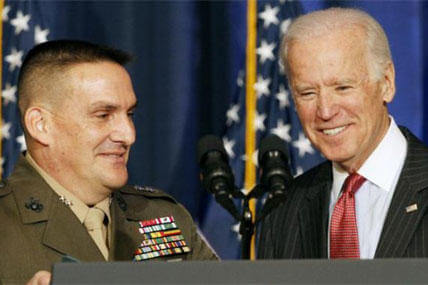Vice President Joe Biden warned Thursday of a "long fight ahead" in Iraq while sidestepping questions over where the next offensive against ISIS should be directed following the retaking of Tikrit.
Biden suggested that decisions on whether to focus on freeing the northern city of Mosul or to press on ISIS strongholds to the south and west in Anbar province along the Euphrates River might come next week when Iraqi Prime Minister Haider al-Abadi visits Washington. Biden appeared to see merit in both approaches.
Biden noted during his speech at the National Defense University that Abadi had met earlier this week in Irbil, the capital of the Kurdish region, with Kurdish leader Massoud Barzani to discuss the general outlines of plans drawn up by Gen. Lloyd Austin, head of the U.S. Central Command, for the liberation of Mosul.
Biden said Abadi discussed "cooperation with the Pesh (Kurdish Peshmerga forces) in a plan coordinated with Gen. Austin in part to help liberate Mosul," Iraq’s second largest city, from the grip of the Islamic State of Iraq and Syria (ISIS).
Biden also said that Abadi on Wednesday met with Sunni tribal leaders in Anbar to deliver arms "in preparation for the liberation of Anbar as part of his commitment that he made with the Sunni leaders."
Biden, considered the Obama administration’s point man on Iraq, directed much of his speech to disputing the claims of critics who, he said, have argued that the campaign against ISIS "has stalled, has been stalemated," and that "Iran and its proxies are leading the fight."
"The jury’s still out, that’s the truth, but the momentum is in the right direction," Biden said, echoing previous statements by Austin and Joint Chiefs Chairman Gen. Martin Dempsey.
Biden used the alternate acronym "ISIL" in referring to ISIS in stating that "we’re pounding ISIL from the sky" with coalition airstrikes. "ISIL has lost large areas they used to dominate. ISIL’s momentum in Iraq has been halted and in many places reversed."
Biden cited "reports of demoralization in ISIL ranks. ISIL’s aura of invincibility has been pierced."
However, Biden said that Iraq remains a "dangerous, dangerous, dangerous place" and success will depend upon healing the sectarian rifts between Sunni, Shia and Kurdish communities that had threatened to split the country apart.
Success will also depend upon continued U.S. support, Biden said. He said 6,000 Iraqi troops had been trained thus far by U.S. advisors, and 100 million rounds of ammunition, 62,000 small arms, more than 1,000 Hellfire missiles and 250 MRAPs (Mine Resistant-Ambush Protected) vehicles had been delivered to the Iraqi Security Forces.
An additional 50 MRAPs equipped with mine rollers to destroy improvised explosive devices were being supplied to the ISF this week, Biden said.
Much of the criticism of the U.S. effort in Iraq has centered on the growing influence of Iran and the Iraqi Shiite militias in the campaign to oust ISIS, but Biden insisted that most Iraqis "don’t want to be owned by anybody" or to be "drawn into a regional conflict."
Biden said it was to be expected that Iraq would pursue "normal relations with Iran" as a neighboring state "but Iraq must be free to make its own sovereign choices."
An opposing assessment has been offered by retired Army Gen. David Petraeus, the former U.S. commander in Iraq and Afghanistan. The White House acknowledged last month that it was consulting with Petraeus on the Mideast strategy.
In an interview with the Washington Post, Petraeus said that Iran remained "deeply hostile" to U.S. interests in the region. "The current Iranian regime is not our ally in the Middle East. It is ultimately part of the problem, not the solution," Petraeus said.
He warned that Iranian-backed militias now operating in Iraq posed a greater long-term threat to the country's future stability than ISIS.
In a plea bargain with federal authorities last month, Petraeus admitted to sharing classified information with his former mistress and biographer. The plea bargain called for two months probation and a $40,000 fine.
The difficulties ahead for Iraq in achieving Sunni-Shia unity against ISIS were underlined by remarks last week by Hadi al-Ameri, head of Iraq's Shia militias known the Popular Mobilization Units (PMU).
At a news conference in Tikrit, which was retaken after heavy U.S. airstrikes, al-Ameri scorned the role of American airpower in the assaults that ousted ISIS from the city that was the hometown of the late dictator Saddam Hussein.
"If the Iraqi government wants to be thankful to the United States for the Tikrit operation, let them be, but we will not give credit to the U.S.-led coalition and we don’t need them here," al-Ameri said.
-- Richard Sisk can be reached at richard.sisk@military.com



























